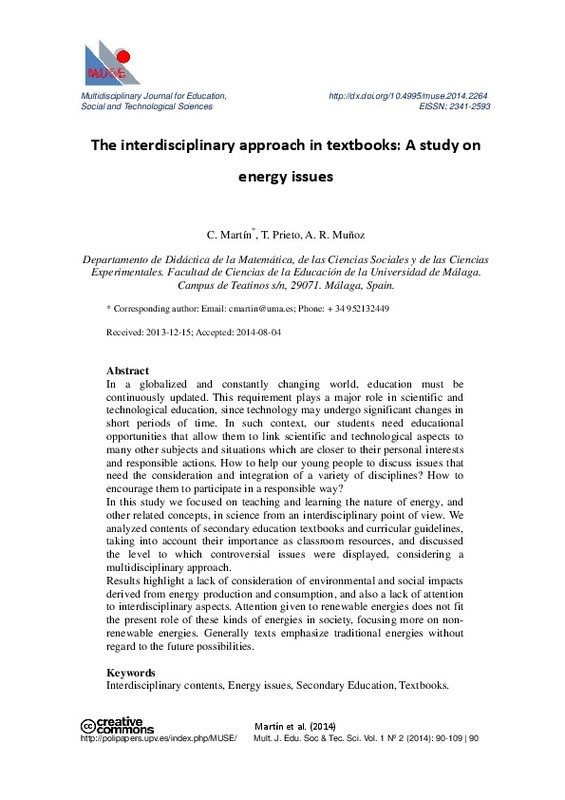JavaScript is disabled for your browser. Some features of this site may not work without it.
Buscar en RiuNet
Listar
Mi cuenta
Estadísticas
Ayuda RiuNet
Admin. UPV
The interdisciplinary approach in textbooks: A study on energy issues
Mostrar el registro sencillo del ítem
Ficheros en el ítem
| dc.contributor.author | Martín Gámez, Carolina
|
es_ES |
| dc.contributor.author | Prieto Ruz, Teresa
|
es_ES |
| dc.contributor.author | Muñoz Gallego, Antonio Roman
|
es_ES |
| dc.date.accessioned | 2014-11-25T11:07:59Z | |
| dc.date.available | 2014-11-25T11:07:59Z | |
| dc.date.issued | 2014-09-18 | |
| dc.identifier.uri | http://hdl.handle.net/10251/44804 | |
| dc.description.abstract | [EN] In a globalized and constantly changing world, education must be continuously updated. This requirement plays a major role in scientific and technological education, since technology may under goes significant changes in short periods of time. In such context, our students need educational opportunities that allow them to link scientific and technological aspects to many other subjects and situations which are closer to their personal interests and responsible actions. How to help our young people to discuss issues that need the consideration and integration of a variety of disciplines? How to encourage them to participate in a responsible way? In this study we focused on teaching and learning the nature of energy, and other related concepts, in science from an interdisciplinary point of view. We analyzed contents of secondary education textbooks and curricular guidelines, taking into account their importance as classroom resources, and discussed the level to which controversial issues were displayed, considering a multidisciplinary approach. Results highlight a lack of consideration of environmental and social impacts derived from energy production and consumption, and also a lack of attention to interdisciplinary aspects. Attention given to renewable energies does not fit the present role of these kinds of energies in society, focusing more on non-renewable energies. Generally texts emphasize traditional energies without regard to the future possibilities. | es_ES |
| dc.language | Inglés | es_ES |
| dc.publisher | Editorial Universitat Politècnica de València | |
| dc.relation.ispartof | Multidisciplinary Journal for Education, Social and Technological Sciences | |
| dc.rights | Reconocimiento - No comercial - Sin obra derivada (by-nc-nd) | es_ES |
| dc.subject | Interdisciplinary contents | es_ES |
| dc.subject | Energy issues | es_ES |
| dc.subject | Secondary Education | es_ES |
| dc.subject | Textbooks | es_ES |
| dc.title | The interdisciplinary approach in textbooks: A study on energy issues | es_ES |
| dc.type | Artículo | es_ES |
| dc.date.updated | 2014-11-24T16:35:59Z | |
| dc.identifier.doi | 10.4995/muse.2014.2264 | |
| dc.rights.accessRights | Abierto | es_ES |
| dc.description.bibliographicCitation | Martín Gámez, C.; Prieto Ruz, T.; Muñoz Gallego, AR. (2014). The interdisciplinary approach in textbooks: A study on energy issues. Multidisciplinary Journal for Education, Social and Technological Sciences. 1(2):90-109. https://doi.org/10.4995/muse.2014.2264 | es_ES |
| dc.description.accrualMethod | SWORD | es_ES |
| dc.relation.publisherversion | https://doi.org/10.4995/muse.2014.2264 | es_ES |
| dc.description.upvformatpinicio | 90 | es_ES |
| dc.description.upvformatpfin | 109 | es_ES |
| dc.type.version | info:eu-repo/semantics/publishedVersion | es_ES |
| dc.description.volume | 1 | |
| dc.description.issue | 2 | |
| dc.identifier.eissn | 2341-2593 | |
| dc.description.references | Bliss, J., Monk, M. & Ogborn, J. (1983). Qualitative Data Analysis for Educational Research. London: Croom-Helm. | es_ES |
| dc.description.references | Delors, J. (1996). La educación encierra un tesoro. México: Ediciones UNESCO. | es_ES |
| dc.description.references | Edwards, M., Gil, D., Vilches, A. & Praia, J. (2004). La atención a la situación del mundo en la educación científica. Ense-anza de las Ciencias, 22 (1), 47-64. | es_ES |
| dc.description.references | Fernandez, M. A. (2010). O ensino das enerxias renovabeis factor clave na educación enerxética. Boletín das Ciencias, 69, 103-115. | es_ES |
| dc.description.references | García-Carmona, A. (2008). Relaciones CTS en la Educación Científica Básica. I. Un análisis desde los textos escolares en la ense-anza electrónica. Ense-anza de las Ciencias, 26(3), 375–388. | es_ES |
| dc.description.references | Holbrook, J. & Rannikmäe, M. (2009). The meaning of scientific literacy. International Journal of environmental and Science Education, 4 (3), 275-288. | es_ES |
| dc.description.references | Jiménez, J. D. & Sampedro, C. (2006). ¿Son las Energías alternativas la solución del futuro? Alambique, 49, 71-80. | es_ES |
| dc.description.references | Lemke, J. L. (2006). Investigar para el futuro de la educación científica: Nuevas formas de aprender, Nuevas formas de vivir. Ense-anza de las Ciencias, 24(1), 5–12. | es_ES |
| dc.description.references | Martín, C. & Prieto, T. (2011). El potencial educativo del problema energético en la sociedad actual. En J. J. Maquilón, A. B. Mirete, A. Escarbajal & A. M. Giménez (Eds.), Cambios educativos y formativos para el desarrollo humano y sostenible (pp. 29-38). Murcia: Edit.um. | es_ES |
| dc.description.references | Solomon, J. (1983). Messy, contradictory, and obstinately persistent: A study of children's out-of-school ideas about energy. School Science Review, 65(231), 225 -233. | es_ES |
| dc.description.references | Zembylas, M. (2007). Emotional ecology: The intersection of emotional knowledge and pedagogical content knowledge in teaching. Teaching and Teacher Education, 23(4), 355-367. doi:10.1016/j.tate.2006.12.002 | es_ES |








